- Conduct a thorough exterior and interior inspection of your RV for any signs of damage, pest intrusion, or water infiltration that may have occurred during storage.
- Remove any covers or protective materials and inspect for any issues hidden beneath.



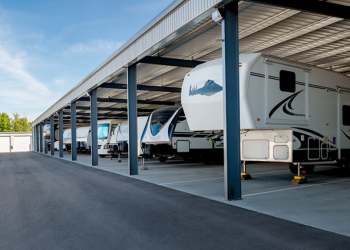
modSTORAGE | RV Storage
Protect Your RV When You're Not Using It. Compare Self Storage Units Now!
Don't Overspend on Storage: modSTORAGE Offers Cheap Self Storage Units with Monitored Security.
Introduction to RV Storage
Proper RV storage is not merely a matter of convenience; it's a critical component of maintaining your vehicle's longevity, ensuring it remains ready for your next adventure. Whether you're a weekend warrior hitting the road sporadically or a seasoned traveler who lives out of their RV for months at a time, understanding how to store your RV correctly is essential. This guide is designed to navigate you through the myriad aspects of RV storage, from preparation and choosing the right storage solution to the legalities and ongoing maintenance required to keep your RV in pristine condition.
RVs are substantial investments, not just in financial terms but also as vessels of our dreams, adventures, and the freedom to explore. However, the elements, from the blistering sun to freezing temperatures, can take a toll on your vehicle if it's not properly protected. Moreover, logistical constraints like space limitations at home or local regulations may necessitate finding an external storage solution. This comprehensive exploration into RV storage will cover the reasons for storing your RV, how to prepare it for storage, choosing the right storage option, and how to maintain it while stored and upon return to use.
The Importance of RV Storage
Storing your RV is about more than just parking it until your next trip. It's about safeguarding your mobile home from environmental damage, theft, and deterioration. The right storage solution can prevent common issues such as tire flat-spotting, battery drain, and seal degradation. Moreover, it can save you significant money and time on repairs and maintenance in the long run.
Customized Storage Needs
Every RV and owner has unique storage needs based on the type of RV, geographic location, usage patterns, and personal circumstances. Some might require seasonal storage solutions to protect against winter's harshness, while others might look for long-term options due to travel or residential space constraints. This guide will delve into various storage solutions, offering insights to help you make the best decision for your specific situation.
Preparing for Storage
A crucial aspect of RV storage is the preparation process. Properly preparing your RV for storage can significantly impact its condition upon return to active use. This involves a series of steps from thorough cleaning to specific system maintenance tasks designed to protect your vehicle while it's not in use.
Navigating Through This Guide
As we journey through the essential topics related to RV storage, this guide aims to equip you with the knowledge and tools needed to protect your investment effectively. By understanding and implementing best practices in RV storage, you ensure that your home-on-wheels remains in top condition, ready to carry you to your next destination, whenever that may be.
Let's embark on this journey together, exploring the depths of RV storage to ensure your vehicle remains safe, secure, and well-maintained, no matter where your adventures take you.
Reasons for RV Storage
Choosing to store an RV is driven by various factors that extend beyond mere convenience. These reasons highlight the diverse needs of RV owners and underscore the importance of finding tailored storage solutions. Understanding why RV storage is essential can help owners make informed decisions that protect their investment and ensure their vehicle is ready for the next journey. Here’s an in-depth look at the common reasons prompting RV owners to seek out storage solutions.
Seasonal Considerations
- In regions where winter brings freezing temperatures and snow, storing an RV protects it from harsh weather conditions that can cause damage to its exterior and mechanical systems.
- Conversely, in extremely hot climates, protection from the relentless sun can prevent UV damage to the RV’s paint, tires, and interior.
Long-Term Travel or Absence
- RV owners who travel abroad or have work commitments that take them away from home for extended periods may require secure storage solutions to safeguard their vehicles during their absence.
Space Limitations and Local Regulations
- Not all residential areas have the space to accommodate an RV, especially for those living in urban settings or communities with strict homeowners’ association (HOA) rules regarding large vehicle parking.
- Local regulations or zoning laws may also restrict the ability to park RVs on the street or in driveways, necessitating off-site storage.
Protective Measures
- Storing an RV can be a proactive measure to protect it from vandalism, theft, or accidental damage. Secure storage facilities offer peace of mind that the vehicle is safe during periods of non-use.
- For owners of vintage or high-value RVs, storage is a way to preserve the vehicle's condition and maintain its value.
Maintenance and Upkeep
- Some owners opt for storage solutions that offer maintenance services, ensuring their RV remains in top condition through professional care, which can be especially beneficial for those less familiar with the intricacies of RV maintenance.
Conclusion
The decision to store an RV is multifaceted, reflecting the diverse lifestyles and needs of RV owners. Whether motivated by weather protection, security, space constraints, or maintenance considerations, choosing the right storage solution is crucial. It not only preserves the RV’s condition but also provides owners with peace of mind, knowing their home away from home is safely tucked away until the next adventure beckons. Understanding these reasons helps tailor the storage approach, ensuring each RV receives the care and protection it deserves.
Preparing Your RV for Storage
Properly preparing your RV for storage is crucial to ensuring it remains in excellent condition, ready for your next adventure. The process involves several key steps designed to protect your vehicle from potential damage while it's not in use. This comprehensive approach addresses both the interior and exterior of the RV, along with mechanical systems, to prevent common issues such as mold, pest infestation, and system degradation. Here’s a detailed guide on how to prepare your RV for storage.
Interior Preparation
- Clean Thoroughly: Start by deep cleaning the interior to remove food remnants, dirt, and debris. This helps prevent mold, mildew, and pests. Vacuum carpets, clean surfaces, and consider steam cleaning upholstery.
- Remove Perishables and Valuables: Empty all cabinets and refrigerators of food to avoid attracting pests. Remove valuable items and personal belongings.
- Moisture Control: Use moisture absorbers or a dehumidifier to prevent the buildup of dampness inside your RV, which can lead to mold and mildew.
- Ventilation: Leave vents slightly open if using a breathable RV cover or if stored indoors to promote air circulation and further prevent moisture accumulation.
Exterior Preparation
- Wash and Wax: Give your RV a thorough wash to remove road grime, sap, and dirt. Apply a coat of quality wax to protect the paint from UV damage and environmental pollutants.
- Seal Inspection: Check all windows, doors, and exterior seams for leaks or cracks. Apply sealant where necessary to prevent water intrusion.
- Covering: Use a high-quality, breathable RV cover that fits snugly. This protects the exterior from UV rays, rain, snow, and debris. Ensure the cover is secured to prevent wind damage.
Mechanical and System Checks
- Battery Maintenance: Disconnect the battery to prevent drain. If storing for an extended period, consider removing the battery and storing it in a cool, dry place.
- Tire Protection: Inflate tires to the recommended pressure to prevent flat spots. For long-term storage, consider using tire covers or placing the RV on jacks to relieve pressure on the tires.
-
Fluids and Tanks:
- Engine and Generator: Change the oil and oil filters to remove contaminants before storage. Fill the gas tank and add a fuel stabilizer to prevent the fuel from degrading.
- Water Systems: Drain all water tanks, including fresh, gray, and black water systems. Use antifreeze in the plumbing system if storing in freezing conditions.
- Propane Tanks: Turn off and disconnect propane tanks. Store them securely and check regulations about propane storage at your chosen facility.
Pest Prevention
- Inspect the RV for any openings where pests could enter. Seal gaps and consider using natural deterrents like mothballs or peppermint oil to discourage rodents and insects.
Taking the time to properly prepare your RV for storage can save you time, money, and hassle in the long run. By following these detailed steps, you ensure that every aspect of your RV is protected against potential damage during its storage period. This thorough approach ensures that when it's time to hit the road again, your RV will be in top condition, ready for the adventures ahead.
Choosing the Right Self-Storage
Solution for Your RV or Camper
Selecting the appropriate storage solution for your RV is a decision that impacts not only the preservation and security of your vehicle but also your peace of mind. The right storage solution depends on several factors, including your geographical location, the size of your RV, the duration of storage, and your budget. Here’s an in-depth exploration of the various storage options available, helping you navigate through the choices to find the best fit for your needs.
Indoor vs. Outdoor Storage
- Indoor Storage: Offers the highest level of protection from the elements, pests, and potential theft. Ideal for long-term storage or for owners of high-value RVs who want to maintain their vehicle in pristine condition. Some facilities offer climate-controlled environments, which is especially beneficial in areas with extreme weather conditions.
- Outdoor Storage: A more cost-effective option that can be suitable for shorter storage periods or for owners in milder climates. Outdoor storage lots may offer covered spaces that provide some protection against sun and precipitation.
Specialized RV Storage Facilities
- Facilities dedicated to RV storage often provide enhanced security features, such as surveillance cameras, gated access, and on-site staff. They may also offer amenities like dump stations, wash bays, and electrical hookups for battery maintenance.
Home Storage
- Storing your RV at home is an option for those who have the space and live in areas without restrictive HOA rules or zoning laws. This option offers convenience and immediate access, though it may require investment in a suitable cover or carport to provide protection from the elements.
Considerations for Choosing Storage
- Security: Assess the security measures in place at storage facilities, including fencing, lighting, surveillance, and access control.
- Accessibility: Consider how often you’ll need access to your RV. Some facilities offer 24/7 access, while others have limited hours.
- Protection: Evaluate the level of protection each option offers against weather, temperature fluctuations, and potential vandalism or theft.
- Cost: Compare costs across different storage options. Indoor and climate-controlled facilities will generally be more expensive than outdoor lots.
- Additional Services: Some storage facilities offer extra services such as pre-storage preparation and post-storage cleaning and maintenance checks. These can add convenience but may also influence the cost.
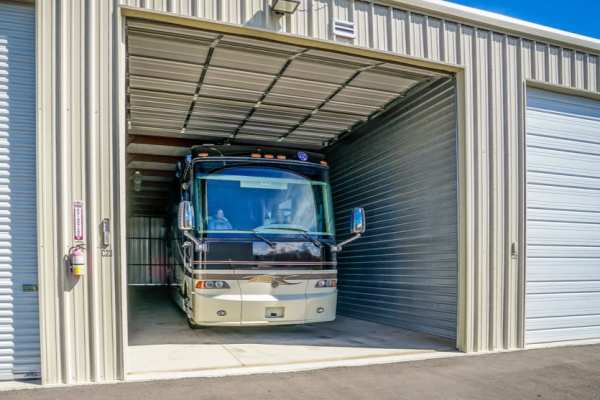
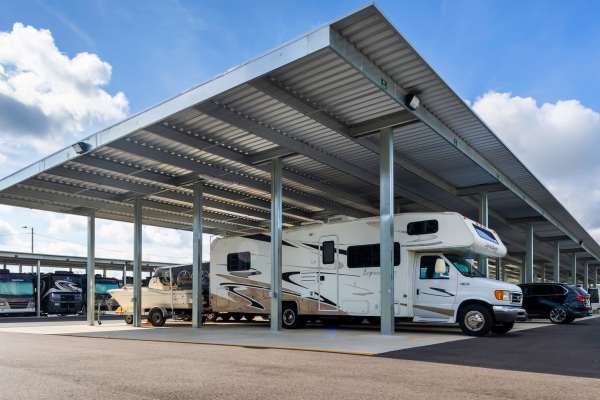
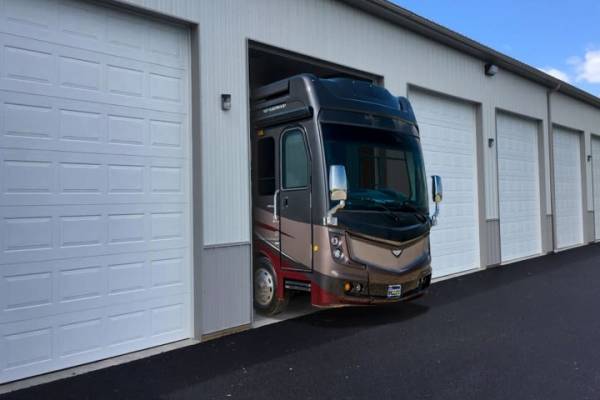
Choosing the right storage solution for your RV involves weighing various factors to ensure your vehicle is well-protected and remains in good condition while not in use. Whether opting for the enhanced protection of indoor storage, the affordability of outdoor options, or the convenience of home storage, it’s important to consider the specific needs of your RV and your personal preferences. By carefully evaluating each option and taking into account factors like security, accessibility, and cost, you can select a storage solution that offers the best combination of protection and value for your RV.
Maintenance During RV Storage
Even when safely tucked away, RVs require ongoing maintenance to ensure they remain in top condition. This maintenance is crucial for preventing degradation and ensuring your RV is ready to hit the road when you are. From keeping batteries charged to preventing pest infestations, here are the essential maintenance tips to follow during your RV's storage period.
Regular Checks
- Conduct periodic inspections of your RV, even if it's in a secure facility. Look for any signs of water ingress, damage to the cover or structure, and check for any evidence of pests.
- For outdoor stored RVs, remove any debris like leaves or snow that may accumulate on or around the vehicle to prevent moisture-related issues or external damage.
Battery Maintenance
- For extended storage periods, disconnect the battery to prevent drainage. If possible, remove the battery and store it in a cool, dry place. Alternatively, use a trickle charger to keep the battery at optimal charge levels without overcharging.
Tire Care
- Inflate tires to the recommended pressure to prevent flat spots from forming during long periods of inactivity. Consider using tire covers to protect against UV damage if stored outdoors.
- If feasible, placing the RV on jacks can relieve pressure on the tires and suspension system, extending their lifespan.
Pest Control
- Ensure all vents, windows, and doors are securely closed or screened to prevent pests from entering. Consider using natural deterrents like mothballs or peppermint oil in and around the RV to discourage rodents and insects.
- Regularly inspect for signs of pests and address any infestations immediately to prevent damage.
Ventilation
- Poor ventilation can lead to mold and mildew growth inside the RV. Use vent covers that allow air circulation while preventing water ingress. For indoor stored RVs, consider slightly opening a roof vent if the storage environment is secure and allows for it.
Fluids and Fuel
- Top off fuel tanks and add a fuel stabilizer to prevent the fuel from degrading and to protect the engine. Run the engine and generator briefly after adding the stabilizer to ensure it's distributed throughout the system.
- Check and maintain fluid levels, including engine oil, coolant, and brake fluid. Consider changing the oil and filters before long-term storage to remove contaminants.
Seals and Slide-Outs
- Inspect all exterior seals for cracks or gaps where moisture could enter. Reapply sealant as needed.
- If your RV has slide-outs, consider lubricating the mechanisms and seals to keep them operating smoothly and to prevent rubber degradation.
Conclusion
Maintaining your RV during storage is a proactive step towards ensuring its longevity and readiness for use. These maintenance tasks not only protect your RV from potential damage but also help in preserving its value. Regular checks, coupled with specific care for batteries, tires, and pest control, form the backbone of effective RV storage maintenance. By dedicating time to these tasks, you’re investing in the future enjoyment and reliability of your RV, ensuring it serves as a home away from home for many adventures to come.
Legal & Insurance Considerations
for RV Storage
When storing your RV, it’s essential to navigate the legal and insurance aspects to ensure you're fully protected against potential liabilities and financial losses. These considerations are often overlooked but play a crucial role in the storage process. From understanding storage facility contracts to adjusting your RV insurance coverage, here’s a comprehensive guide on the legal and insurance implications of RV storage.
Understanding Storage Facility Contracts
- Liability Clauses: Pay close attention to clauses regarding the storage facility’s liability for damage or theft. Facilities often limit their liability, which might necessitate additional insurance coverage on your part.
- Access and Use: Ensure you're clear on the terms regarding access to your RV during storage. Some contracts may restrict access times or require advance notice.
- Termination and Fees: Understand the terms for terminating the storage agreement and any fees associated with early termination or late payments.
Insurance Coverage During Storage
- Policy Adjustments: Contact your insurance provider to discuss how storing your RV affects your coverage. You might be able to adjust your policy to reflect reduced risk during storage periods, potentially lowering your premiums.
- Comprehensive Coverage: Ensure your policy includes comprehensive coverage for theft, vandalism, and natural disasters while in storage. Don’t assume the storage facility’s insurance will cover these risks for your RV.
- Proof of Insurance: Some storage facilities require proof of insurance. Keep your insurance documents up to date and readily available.
Local Regulations and Compliance
- Zoning Laws: If storing your RV at home, check local zoning laws and HOA rules that may affect RV storage on your property. Violations can lead to fines or forced removal of your RV from your property.
- Environmental Regulations: Be aware of any environmental regulations that apply to RV storage, especially concerning fluid disposal and vehicle maintenance within the storage facility.
Documenting the RV’s Condition
- Before placing your RV in storage, document its condition with photos or videos. This can serve as evidence if you need to file an insurance claim for damage that occurs during storage.
Securing Your RV
- Take steps to secure your RV, such as using wheel locks or a hitch lock, even when stored in a secured facility. Demonstrating that you’ve taken measures to protect your property can be beneficial in insurance claims and disputes.
Conclusion
Legal and insurance considerations are integral to the RV storage process, providing a framework that protects both the RV owner and the storage provider. By carefully reviewing storage contracts, adjusting insurance coverage, and complying with local regulations, RV owners can mitigate risks and ensure their vehicle is well-protected during storage. Keeping thorough records and understanding your rights and responsibilities can prevent potential headaches and financial losses, allowing you to focus on planning your next great RV adventure.
.
Retrieving Your RV from Storage
Retrieving your RV from storage marks the beginning of new adventures on the open road. However, the transition from storage back to active use requires careful attention to ensure your RV is safe and ready for travel. Here's a detailed guide on the steps to take when retrieving your RV from storage, focusing on system checks, cleaning, and maintenance tasks to prepare for seamless operation.
- Battery: Reinstall and check the battery if it was removed or disconnected. Ensure it's fully charged and the connections are clean and tight.
- Tires: Check tire pressure and inflate them to the recommended levels. Inspect for any signs of cracking, flat spots, or other damage.
- Engine and Generator: Check fluid levels (oil, coolant, brake fluid) and top off as necessary. Consider changing the oil if it wasn’t done prior to storage. Start the engine and generator to ensure they're operating smoothly.
- Appliances and Systems: Test all appliances, HVAC systems, and plumbing for proper operation. Look for any leaks or issues that may need addressing.
- Electrical Systems: Test lights, indicators, and electronic devices to ensure everything is working correctly.
- Interior Cleaning: Clean the interior thoroughly to remove any dust or mustiness accumulated during storage. Open windows and vents to air out the interior.
- Exterior Wash: Wash the exterior of your RV to remove any dirt or grime, paying special attention to the roof and undercarriage if accessible.
- Verify that all safety equipment, including fire extinguishers, smoke detectors, and carbon monoxide detectors, are in working order and have not expired.
- Ensure your first aid kit is stocked and accessible.
- Check that your RV’s registration, insurance, and any necessary permits are up to date and in compliance with your travel plans.
- Review and organize any maintenance records or warranties that may be relevant for upcoming trips.
- Stock up on essentials and check your packing list for any updates or additions based on your destination and the length of your trip.
- Plan a short local trip or a stay at a nearby campground to fully assess your RV’s readiness before embarking on longer journeys.
Conclusion
Retrieving your RV from storage is an exciting step towards your next travel experiences. By methodically checking and preparing your RV for departure, you ensure a safe and enjoyable journey ahead. This comprehensive approach to reactivation not only preserves your RV’s condition but also contributes to the overall success of your adventures, making every trip memorable for the right reasons.
Ongoing Maintenance After RV Storage
Bringing your RV out of storage and back into active use requires not just a thorough initial check but an ongoing maintenance routine to ensure it remains in top condition throughout the travel season. Regular maintenance is key to extending the life of your RV, enhancing safety, and ensuring reliability on the road. Here’s a guide to the essential maintenance tasks and considerations for your RV after retrieving it from storage.
Engine and Mechanical Systems Maintenance
- Regularly check engine oil, coolant, transmission fluid, and brake fluid levels, topping up or changing them as needed based on the manufacturer’s recommendations and usage.
- Monitor the engine and generator for any unusual noises or performance issues. Schedule professional service if any irregularities are detected.
Tire Maintenance
- Continue to monitor tire pressure and adjust as needed for different loads and temperatures. Inspect tires for wear and tear before each trip and replace them if they show signs of damage or excessive wear.
- Rotate tires periodically to ensure even wear, extending their lifespan and improving road handling.
Battery Care
- Keep the battery terminals clean and check the battery’s charge level regularly. For RVs used sporadically, consider using a trickle charger to maintain battery charge between outings.
Plumbing and Water Systems
- Regularly inspect plumbing for leaks, especially after changes in temperature that could affect pipes and fixtures.
- Sanitize the water system at least once a season to prevent bacterial growth, following the manufacturer’s guidelines for safe and effective sanitation.
Appliance and System Checks
- Test all appliances, including the stove, oven, refrigerator, and HVAC system, before each trip. Address any operational issues promptly to avoid inconveniences while on the road.
- Clean or replace filters in air conditioning units and furnaces according to the maintenance schedule.
Exterior and Interior Care
- Wash the exterior of your RV regularly to remove road grime, salt, and debris. Apply a UV protectant to the exterior to help prevent sun damage.
- Keep the interior clean and dry. Regularly check for signs of moisture or leaks, especially after heavy rain, and address any issues immediately to prevent mold and mildew.
Safety Equipment
- Test smoke detectors, carbon monoxide detectors, and LP gas detectors regularly, replacing batteries as needed. Ensure that fire extinguishers are fully charged and accessible.
Documentation and Records
- Keep detailed records of all maintenance activities, repairs, and service checks. This documentation can be invaluable for warranty claims, future troubleshooting, and resale purposes.
Conclusion
Post-storage maintenance is an ongoing commitment that ensures your RV is always ready for the road, providing safe and enjoyable travel experiences. By adhering to a regular maintenance schedule and addressing issues as they arise, you can prevent minor problems from becoming major repairs and enjoy peace of mind during your adventures. Remember, a well-maintained RV is the foundation of countless memorable journeys and the key to unlocking the full potential of your home on wheels.
Mastering RV Storage for Enduring Adventures
Embarking on the journey of RV storage is an integral aspect of RV ownership, reflecting a commitment to preserving the condition, functionality, and value of your cherished vehicle. Through this comprehensive guide, we've explored the multifaceted approach to RV storage, from the initial decision-making process and preparation to choosing the right storage solution and ensuring ongoing maintenance. Each step is a building block in creating a secure environment for your RV, safeguarding it against the elements, potential damage, and the tolls of time.
The Foundation of RV Storage
Understanding the reasons behind RV storage, whether for seasonal protection, compliance with local regulations, or safeguarding against environmental wear, sets the stage for effective storage planning. The meticulous preparation of your RV, encompassing everything from thorough cleaning to system checks and pest prevention, is pivotal in ensuring your vehicle remains in peak condition during its storage period.
Choosing the Right Path
Navigating the array of storage options highlights the importance of aligning your choice with your RV’s specific needs and your personal circumstances. Whether opting for the enhanced security of indoor storage, the cost-effectiveness of outdoor options, or the convenience of home storage, the goal remains consistent: to provide the best possible care for your RV.
Legal and Insurance Safeguards
Delving into the legal and insurance considerations underscores the necessity of proactive management and due diligence. These steps ensure that beyond the physical care of your RV, you're also protecting yourself against potential legal and financial pitfalls associated with storage.
A Journey of Ongoing Care
Emerging from storage and reactivating your RV for new adventures requires attention to detail and adherence to maintenance best practices. This cycle of care, from storage to active use and back, is a testament to the joy and freedom that RV ownership brings. It highlights the importance of regular maintenance, safety checks, and the joy of hitting the road in a vehicle that’s been well cared for and is ready for whatever lies ahead.
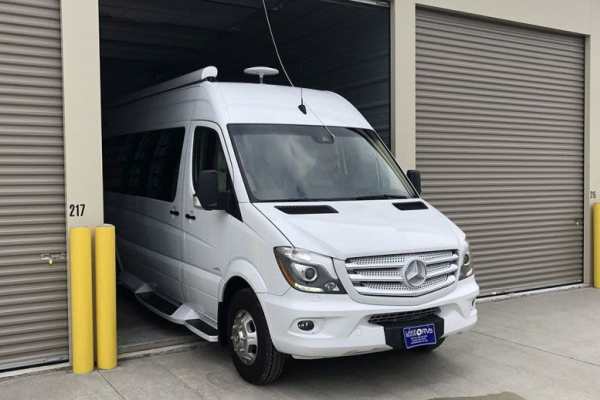
RV Storage FAQ
Choosing between indoor and outdoor storage depends on several factors, including your budget, the climate of your storage location, and the level of protection you wish to provide for your RV. Indoor storage offers the best protection from weather, UV damage, and potential theft but is more expensive. Outdoor storage is more affordable and can be suitable with the right protective measures, such as a high-quality RV cover and regular maintenance checks.
Preparing your RV for storage involves thoroughly cleaning the interior and exterior, checking and maintaining fluid levels, ensuring the battery is charged or disconnected, inflating tires to the correct pressure, and covering the RV with a breathable cover. Also, ensure all openings are sealed to prevent pests from entering.
Yes, you can store your RV at home if you have sufficient space and if local zoning laws, community regulations, or homeowners' association (HOA) rules allow it. It's important to consider the security and protection of your RV when storing at home, including using covers and potentially installing additional security measures.
It's advisable to check on your RV at least once a month during storage. Look for any signs of pest intrusion, water ingress, or other potential issues. For RVs stored outdoors, more frequent checks may be necessary, especially after severe weather events.
If you identify any issues with your RV during storage, such as a pest infestation, water damage, or mechanical problems, address them as soon as possible. Depending on the severity, you may be able to perform repairs yourself or may need to seek professional service.
Yes, maintaining insurance coverage on your RV, even while it's in storage, is important to protect against unforeseen events like theft, vandalism, or natural disasters. Some insurance companies offer reduced rates for vehicles in storage, so it's worth discussing your options with your provider.
Reactivate your RV by conducting a thorough inspection, reconnecting and testing the battery, checking tire pressure and inflating as needed, and running the engine and generator. Also, flush the water system, check all appliances and systems for proper operation, and perform any necessary maintenance or repairs identified during the inspection.
The FAQs section is an integral part of providing a well-rounded guide to RV storage, offering quick answers to common questions and helping RV owners feel more confident in their storage decisions. By addressing these concerns, your guide can serve as a valuable resource, ensuring RV owners are well-informed and prepared to protect their investment through effective storage practices.
Charting Your Self-Storage Journey
As we conclude this guide, it’s clear that effective RV storage is not just about finding a place to park your vehicle. It’s about taking proactive steps to protect your investment, ensuring that your home on wheels is ready for the many adventures that await. The peace of mind that comes from knowing you've taken all the necessary precautions to protect your RV allows you to focus on what truly matters: enjoying the journey, exploring new horizons, and making lasting memories.
With this guide as your compass, you’re well-equipped to navigate the complexities of RV storage, ensuring your vehicle remains a gateway to adventure and exploration for years to come.
